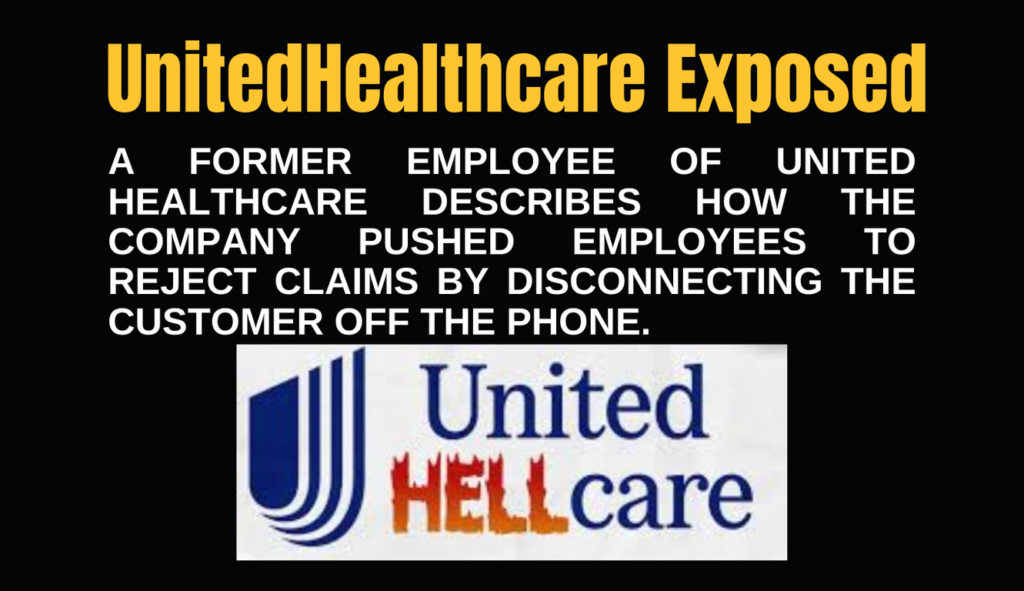A former employee of UnitedHealthcare describes how the company pushed employees to reject claims by disconnecting the customer off the phone

Quick Overview
A former employee of UnitedHealthcare, Natalie Collins, has publicly disclosed troubling details about the company’s training practices, revealing a systematic approach to denying medical claims. This revelation comes amidst the tragic murder of the company’s CEO, Brian Thompson, which has sparked public outrage and discussions about the health insurance industry’s role in healthcare access and affordability.
Key Points
- Claims Denial Training: Collins describes a training program focused solely on denying claims, with no instruction on how to approve them.
- Supervisor Behavior: The training environment was reportedly callous, with supervisors laughing at the distress of clients seeking financial assistance for medical care.
- Public Reaction to CEO’s Murder: Following Thompson’s murder, a significant portion of the public holds the health insurance industry partially responsible for the violence.
- Collins’ Personal Experience: Collins recounts a specific incident that led her to resign, highlighting the emotional toll of denying claims to desperate patients.
- Understanding Public Anger: While condemning violence, Collins expresses empathy for the frustration many feel towards the healthcare system.
Detailed Breakdown
Claims Denial Training
Natalie Collins, a former customer service representative at UnitedHealthcare, revealed that the training provided to employees was exclusively focused on methods to deny insurance claims. This training lasted for the first two to three months of employment, during which employees were not taught how to approve claims or assist clients effectively. Instead, the emphasis was on strategies to delay or reject claims, with the goal of getting clients off the phone as quickly as possible.
Supervisor Behavior
Collins highlights a disturbing culture within the training environment. Supervisors reportedly found amusement in the struggles of clients, laughing as patients expressed their desperation for financial support. This environment created a disconnect between employees and the emotional realities faced by clients, leading to a lack of compassion in handling claims.
Public Reaction to CEO’s Murder
The murder of UnitedHealthcare CEO Brian Thompson has drawn significant media attention and public scrutiny. Thompson was shot dead on December 4, and 26-year-old Luigi Mangione has been arrested for the crime. Although Mangione has pleaded not guilty, public sentiment suggests that many people do not hold him entirely responsible for the act. According to a poll conducted by NORC, 80% of adults believe Mangione bears some responsibility, but 70% also attribute blame to the practices of health insurance companies, particularly regarding claim denials and profit motives.
Collins’ Personal Experience
Collins recounts a poignant story that ultimately led to her resignation from UnitedHealthcare. She attempted to approve a claim for a widowed mother of five whose husband had recently died from pancreatic cancer. Despite her efforts to help, Collins was instructed by her supervisors to deny the claim and expedite the call. This experience left her feeling conflicted and disillusioned, as she witnessed the emotional distress of clients firsthand. She describes a system where claims would be shuffled back into the queue, leaving patients in limbo for extended periods, often without resolution.
Understanding Public Anger
While Collins firmly condemns violence, she acknowledges the anger that many individuals feel towards the healthcare system. She empathizes with those who have faced similar frustrations, stating, “I’ve seen it, I lived it, I processed them and I denied them.” This acknowledgment reflects a broader sentiment among the public, who are increasingly frustrated with the barriers to accessing necessary medical care.
Important Details & Evidence
- Training Duration: The claims denial training lasted two to three months, focusing solely on denial techniques.
- Supervisor Attitude: Supervisors laughed at the emotional distress of clients, creating a hostile and uncaring work environment.
- Public Opinion Poll: The NORC poll indicated that a significant majority of Americans feel both Mangione and the health insurance system share responsibility for the murder of Thompson.
- Collins’ Resignation: Collins left her position after experiencing firsthand the emotional toll of denying claims, particularly in situations involving vulnerable clients.
Final Takeaways
The revelations from Natalie Collins about UnitedHealthcare’s training practices shed light on a troubling aspect of the health insurance industry, where the focus on profit often overshadows the needs of clients. The public’s response to the murder of CEO Brian Thompson indicates a growing frustration with the systemic issues in healthcare access and affordability. Collins’ experiences highlight the real human impact of these policies, as employees grapple with the moral implications of their roles in denying claims. This situation calls for a deeper examination of how health insurance companies operate and the need for reforms that prioritize patient care over profit.